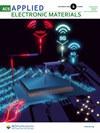Miocene caddisflies from Australia: iron-rich sediments preserve internal organs, tracheoles, and corneal nanocoating of larvae and pupae
IF 4.3
3区 材料科学
Q1 ENGINEERING, ELECTRICAL & ELECTRONIC
引用次数: 0
Abstract
Trichoptera (caddisflies) are insects with terrestrial adults and aquatic larvae. Although caddisflies spend most of their lives as larvae and pupate in the water, fossils of these stages are rarely found. However, ~100 pupae and uncased larvae were discovered at McGraths Flat, an Australian Miocene Lagerstätte. Many of the fossils are extremely well preserved. In addition to external features that include a spinneret among the mouthparts and claws on the abdominal prolegs, some larvae show silk glands, parts of the gastrointestinal tract, and tracheoles. The pupae are all at the pharate stage; in some, large compound eyes can be seen, and some exhibit male genitalia. Scanning electron microscopy revealed ommatidial structures, such as rhabdoms, corneas, and most remarkably the corneal nanocoating. Two caddisfly morphotypes are preserved at McGraths Flat. The larger morphotype belongs to the suborder Annulipalpia and can be assigned, most probably, to the family Dipseudopsidae. The smaller morphotype closely resembles extant members of the family Hydroptilidae (suborder Spicipalpia). No adult caddisflies or individual wings, no immature pupae, and no larval or pupal cases have been found in the deposit. This unusual fossil record suggests an unstable palaeoenvironment characterized by abrupt change.澳大利亚中新世蝶类:富含铁的沉积物保存了幼虫和蛹的内脏、气管和角膜纳米涂层
蝶形目(蝶形虫)是一种具有陆生成虫和水生幼虫的昆虫。虽然蝶蚊一生中大部分时间都是幼虫,并在水中化蛹,但很少发现这些阶段的化石。不过,在澳大利亚中新世的一个拉格斯塔特(Lagerstätte)麦格拉斯平地(McGraths Flat)发现了约 100 个蛹和未被套管的幼虫。许多化石保存得非常完好。除了包括口器中的喷丝器和腹部前肢上的爪等外部特征外,一些幼虫还显示出丝腺、部分胃肠道和气管。蛹都处于法氏囊阶段;有些蛹可以看到大的复眼,有些蛹显示出雄性生殖器。扫描电子显微镜显示了膜状结构,如横纹肌、角膜,最引人注目的是角膜纳米涂层。麦格拉斯平地保存了两种笛鲷形态。较大的形态属于蝶形目(Annulipalpia)亚目,很可能归属于蝶形目(Dipseudopsidae)科。较小的形态与现存的鞘蝶科(Spicipalpia 亚目)成员非常相似。在该矿藏中没有发现成年蝶类或单翅,没有发现未成熟蛹,也没有发现幼虫或蛹。这种不寻常的化石记录表明,当时的古环境并不稳定,以突变为特征。
本文章由计算机程序翻译,如有差异,请以英文原文为准。
求助全文
约1分钟内获得全文
求助全文

 求助内容:
求助内容: 应助结果提醒方式:
应助结果提醒方式:


